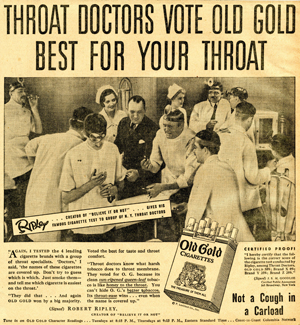Everyone has heard of toothpaste advertisements that announce something along the lines of “9 out of 10 dentists use (insert toothpaste brand).” It is a clever ploy to get the consumer believing that the majority of dental professionals not only use but also recommend a given product. While the worst thing that might happen from using this brand of toothpaste over the other might be stinky breath, what happens when industries recruit the medical community for advertising dangerous products? This is precisely what Big Tobacco did through the majority of the 1900’s with cigarettes. Sometimes the line between science and propaganda gets blurred when vast amounts of money are at stake. When the moral integrity of doctors can be bought, how can the general public believe those doctors ever again when it comes to other recommended products? How do we know for sure a product is indeed safe when a doctor says it is?
An article from Stanford Medicine details how “Tobacco companies sought to exploit the faith the public had in the medical profession as a means of reassuring their customers that smoking was safe,” according to Robert Jackler, MD. “Tobacco companies dreamed up slogans such as, ‘Not one single case of throat irritation with Camels;’ then, to justify their advertising claims, marketing departments sought out pliant doctors to conduct well-compensated, pseudoscientific ‘research,’ which invariably found the sponsoring company’s cigarettes to be safe,” Jackler said. “The companies successfully influenced these physicians not only to promote the notion that smoking was healthful, but actually to recommend it as a treatment for throat irritation.”
Stop and think about that for a moment. Throat doctors recommended a product that had a high potential of giving you throat cancer. This isn’t just a matter of not having research to prove the adverse effects of smoking either. In 1602 an anonymous English author had published an essay called “Worke of Chimney Sweepers (sic)” wherein the writer claimed that illnesses most often seen in chimney sweepers were caused by soot and warned that tobacco may have similar effects. This was one of the earliest known instances of smoking being linked to ill health but certainly not the last. In 1795 Sammuel Thomas von Soemmering reported that he was aware of cancers of the lip in pipe smokers. In 1798 US physician Benjamin Rush wrote on the medical dangers of tobacco and during the 1920’s the first actual medical reports linking smoking to lung cancer were written. Despite the known potential dangers of smoking these Doctor recommended ads for smoking continued to the 1970’s. This clearly isn’t a case of the ignorant, it is a case of immorality and greed.
Many newspaper editors refused to report any of these findings on the dangers associated with smoking because they did not want to offend tobacco companies who advertised heavily in the media. For those of us old enough to remember magazines, and other forms of print journalism we can tell you that every other ad in print was a cigarette ad. In a way you can’t blame the editors or publishers for it, after all they aren’t the arbiters of truth, they are simply entertainment brought you by the advertisements that make the media possible. Doctors on the other hand we can blame. Doctors and the manufacturers of products who hide information that would increase profit at the expense of public safety.
Doctors were corrupted by money and fought voraciously on behalf of the tobacco industry. After the Surgeon General’s Report of 1964 definitively linked smoking with cancer of the larynx, the otolaryngology departmental chairs of four major universities testified before Congress in opposition to the findings. Big tobacco paid throat doctors in positions of authority go before congress and lie on their behalf. How can we know this information and trust anything any drug manufacturer says on a product. Even the regulatory bodies who govern these industries in an effort to prevent public harm were severely late to the ball game when it came to sounding the alarm on the dangers of smoking.
When the moral integrity of doctors can be bought, how can the general public believe those doctors ever again when it comes to other recommended products? How do we know for sure a product is indeed safe when a doctor says it is? The truth is you have to ask the right questions. You have to be willing to research drugs before you take them. You have to think for yourself. And if you are unfortunate enough to be taken advantage of by these companies and their hucksters, you have to be willing to fight legally.
From the collection of Stanford Research Into the Impact of Tobacco Advertising


One thought on “Doctors Promoted Cigarettes”
Yes doctors can be brought, like it is now. My doctor told me that there is med’s that will help me but the hospital that he works for will not let him. That is so wrong. I have 6 disease that ending my life and can’t get any doctors to help me. And there is no other doctors in my town or around my town that doesn’t work for the hospital
I will suffer to I die and they gave me 5 years and that was 3 years ago. So sad and mad. And suffering.